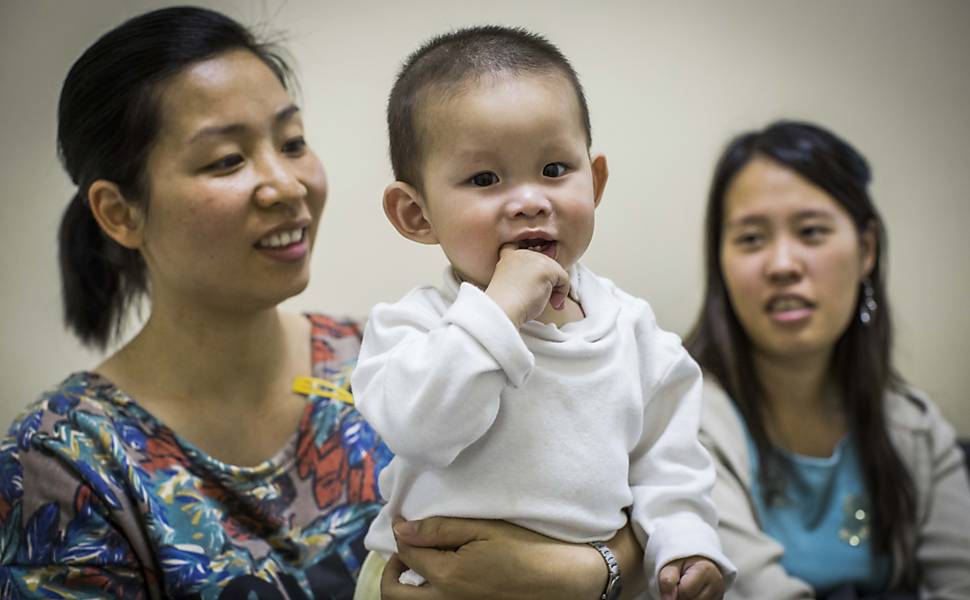Latest Photo Galleries
Brazilian Markets
17h38 Bovespa |
+0,02% | 124.196 |
16h43 Gold |
0,00% | 117 |
17h00 Dollar |
+0,15% | 5,2507 |
16h30 Euro |
+0,49% | 2,65250 |
ADVERTISING
Growing Numbers of Expectant Chinese Women Seeking Healthcare in São Paulo
08/24/2015 - 13h26
Advertising
FABRÍCIO LOBEL
FROM SÃO PAULO
"He shui! He shui!" says nurse Patrícia Pinheiro to expectant mothers at the prenatal section of the Primary Care Unit (UBS, in its Portuguese abbreviation) at Sé, close to the Avenida do Estado, in the center of São Paulo.
With an increasing number of Chinese women seeking assistance at the health center, Pinheiro's instruction to drink water was given not in Portuguese, but Chinese.
According to two doctors, two nurses and an interpreter to whom Folha spoke, the immigrants hope to guarantee their stay in Brazil by having babies in the country. Parents of children born in Brazil cannot be deported, by law.
"Just as many Brazilians try to have children abroad, the same thing happens with foreigners here. It's common," explains Clóvis Silveira Júnior, a doctor and coordinator of the public health centers in the center of São Paulo.
Besides the visa issue, the big Chinese presence is also down to the number of interpreters hired by patients and recent migratory flows.
Currently, there are more than 58,000 Chinese people legalized in Brazil, according to the Ministry of Justice. This figure does not take into account those in Brazil illegally or those in the process of obtaining their documents.
COMMUNICATION
Chinese mothers-to-be are also using private health services, but the clinics and health centers of the Brazilian public health service (SUS) are busiest, in particular the Sé UBS, which attends to retail workers from the nearby Rua 25 de Março, and the Leonor Mendes de Barros maternity hospital, in the neighborhood of Belém.
According to Andréa Garanito, manager at the UBS, nearly 100 of the 300 women currently receiving prenatal treatment at the center are Chinese. Five years ago, it was half that number.
On a Thursday afternoon, Folha met seven of the women in little over an hour at the center. Almost all were reluctant to speak, apart from the homemaker Weini Zhou, 33, mother of Lucas, of ten months. She was at the center seeking assistance for her son who was suffering with earache.
In Chinese, translated by a friend, Weini said that it would be easier if the center had a permanent interpreter, but that the effort of staff helps.
To overcome communication difficulties, the UBS produced a booklet in Mandarin with recommendations for both the prenatal and postnatal periods. Corintio Mariani Neto, director at the Leonor Mendes de Barros, says that the measure will also be adopted at the hospital.
THE INTERPRETER
Six years ago, Hsu Hui Min, 60, worked as a dentist in São Paulo. She decided to switch profession when a Chinese friend asked her if she knew anyone who could act as an interpreter at a doctor's appointment.
Today, she is known amongst Brazilians as Noemi, and she charges her Chinese clients R$50 (USD $14) for the service.
"They know nothing whatsoever about Brazil, they don't know where to go, how to take the metro. I help, I pick them up at home and I interpret for them," she says, with a thick accent, though she has lived in Brazil for decades.
In the last week, Hsu took Shuixia Wang, 29, and Yanju Han, 30, to prenatal appointments at the Sé UBS. Both women are homemakers married to traders who work at the market in the area of the Rua 25 de Março and Brás.
Hsu says she currently has nearly 100 Chinese mothers-to-be as clients in São Paulo. She says that in general they believe the SUS is more reliable than private health services as it is under government control, perhaps a reflection of the culture of the Chinese state.
"It's good here, because they find all the services they need in one place," she says at the Sé UBS. She admits, however, that wealthier women expecting children tend to see private doctors.
ONE-CHILD POLICY
As well as the language barrier, health professionals to whom Folha spoke emphasized the cultural differences between Brazil and China in terms of prenatal care.
According to the gynecologist and obstetrician Hsu Chih Chin, 55, many Chinese women who come to her clinic in Vila Olímpia, in the west of São Paulo, believe that it is impossible to become pregnant twice within five years.
For Hsu, this is just one of many myths common in China, as a result of rigid state control of birthrates. Since the end of the 1970s, China has had a one-child policy, which, with some exceptions, penalizes with heavy fines couples who have more than one child.
While the policy has become somewhat more relaxed in recent years, it has caused enormous demographic imbalances in China and vast numbers of abortions. Most of the aborted fetuses are girls, as families usually prefer boys.
This is reflected even in Brazilian health centers. "Lots of the mothers become depressed when they find out that they're expecting a girl," says nurse Pinheiro. "Being pregnant with a girl is not usually a happy event for the family."
MOTHER'S MILK
Cultural differences are also present in postnatal care. While Brazilian doctors encourage light exercise after the birth of a child, in China new mothers are told to rest for nearly a month. "Many of them stay in rooms without ventilation," says obstetrician Hsu.
Another Chinese custom is a short breastfeeding period. It is common to see Chinese families feeding babies of only three months with powdered milk mixed with quail's eggs.
In contrast, 41% of Brazilian babies are fed exclusively with mother's milk until six months of age, according to figures from the Ministry of Health.
Translated by TOM GATEHOUSE




